The Office of the Director of Public Prosecutions (DPP) in Kenya, led by Renson Ingonga, has faced mounting criticism for selectively withdrawing high-profile corruption cases involving politically connected individuals while aggressively prosecuting dissenters under the Computer Misuse and Cybercrimes Act.
This article analyzes these case withdrawals, arranged chronologically with corrected dates, to expose their severity, the DPP’s duplicity, and the erosion of the rule of law. It contrasts these actions with the persecution of politician and activist Francis Gaitho, Alinur Mohammed, Scofine Aoko Otieno, highlighting a pattern of shielding corrupt elites while silencing critics.
Chronological Analysis of Case Withdrawals
October 2023: Reuben Kiborek (Defilement Case)
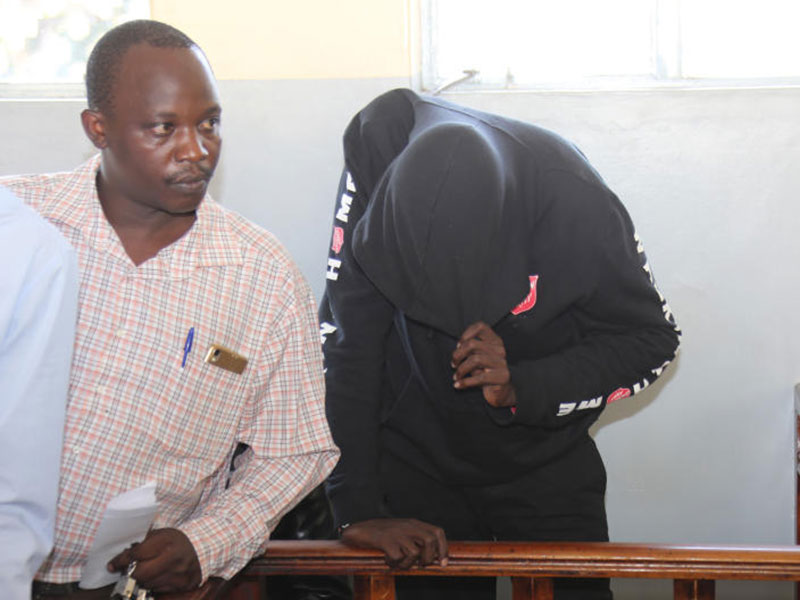
Mogotio MP Reuben Kiborek hides his face in shame after being charged with defilement
-
- Date: October 2023 (corrected from the erroneous mention of 2923).
- Case Details: Ingonga withdrew a defilement case against Mogotio MP Reuben Kiborek, accused of violating a 15-year-old daughter of a Cabinet Secretary. The withdrawal was justified as being in the “public interest,” but no detailed reasoning was provided.
-
- Severity: Defilement, under Kenya’s Sexual Offences Act, is a grave crime with severe consequences for victims, particularly minors. Withdrawing such a case involving a high-profile politician raises concerns about justice for vulnerable populations and impunity for influential figures.
-
- Duplicity: The vague “public interest” justification, without transparent evidence, suggests political interference, especially given Kiborek’s status as an MP. This action violates Article 53(1)(d) of the Kenyan Constitution, which protects children from abuse, and undermines public trust in the justice system’s commitment to victims’ rights.
November 11, 2023: Maina Njenga and Co-Accused (Organized Crime Charges)
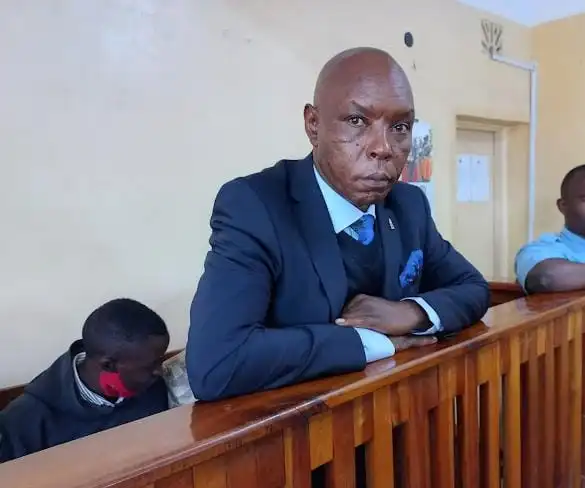
Outlawed Mungiki Sect Leader Maina Njenga whose crimes even featured at the ICC, is a free man as the DPP hunts bloggers
-
- Date: November 11, 2023.
- Case Details: Ingonga withdrew charges against former Mungiki leader Maina Njenga and 10 co-accused, who faced seven counts, including membership in the outlawed Mungiki group and engaging in organized crime in Bahati, Nakuru County. The DPP provided no clear justification, and Njenga’s lawyer, Ndegwa Njiru, celebrated the withdrawal as a victory.
-
- Severity: The charges involved serious allegations of organized crime, linked to Mungiki’s history of violence, extortion, and political manipulation. Withdrawing such a case without explanation undermines efforts to combat organized crime and signals impunity.
-
- Duplicity: The lack of transparency in the withdrawal, coupled with Njenga’s political connections, suggests external influence. This contravenes Article 157(11) of the Kenyan Constitution, which mandates the DPP to act in the public interest and prevent abuse of legal processes.
December 2023: Geothermal Development Company (GDC) Officials (Sh1.7 Billion Graft Case)
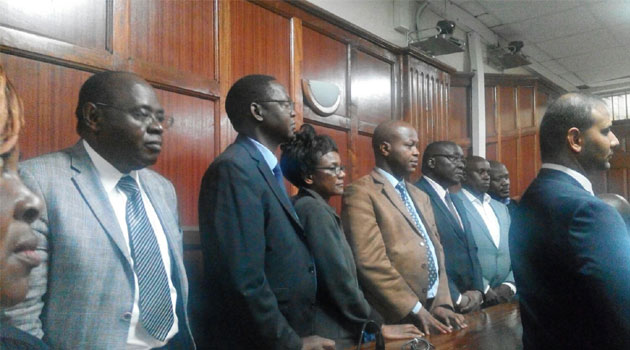
Geothermal Development Corporation’s Silas Simuyu and his co-accused during a hearing
-
- Date: December 2023.
- Case Details: Ingonga attempted to withdraw a Sh1.7 billion corruption case against former GDC managing director Silas Simiyu and others, citing insufficient evidence. The case involved allegations of inflated procurement costs. Nairobi Anti-Corruption Chief Magistrate Thomas Nzyoki rejected the application, ruling that it was not in the public interest and that the case should proceed on merit.
-
- Severity: The misappropriation of Sh1.7 billion in public funds represents a significant loss, depriving citizens of essential services and eroding trust in state institutions.
-
- Duplicity: Despite the Ethics and Anti-Corruption Commission (EACC) providing evidence and Ingonga’s initial consent to prosecute, the attempt to withdraw the case suggests selective justice. Justice Nixon Sifuna condemned this as part of a “notorious” trend of “laundry manner” prosecution practices, highlighting the DPP’s questionable motives.
February 2024: Yagnesh Devani (Ksh 7.6 Billion Triton Petroleum Case)
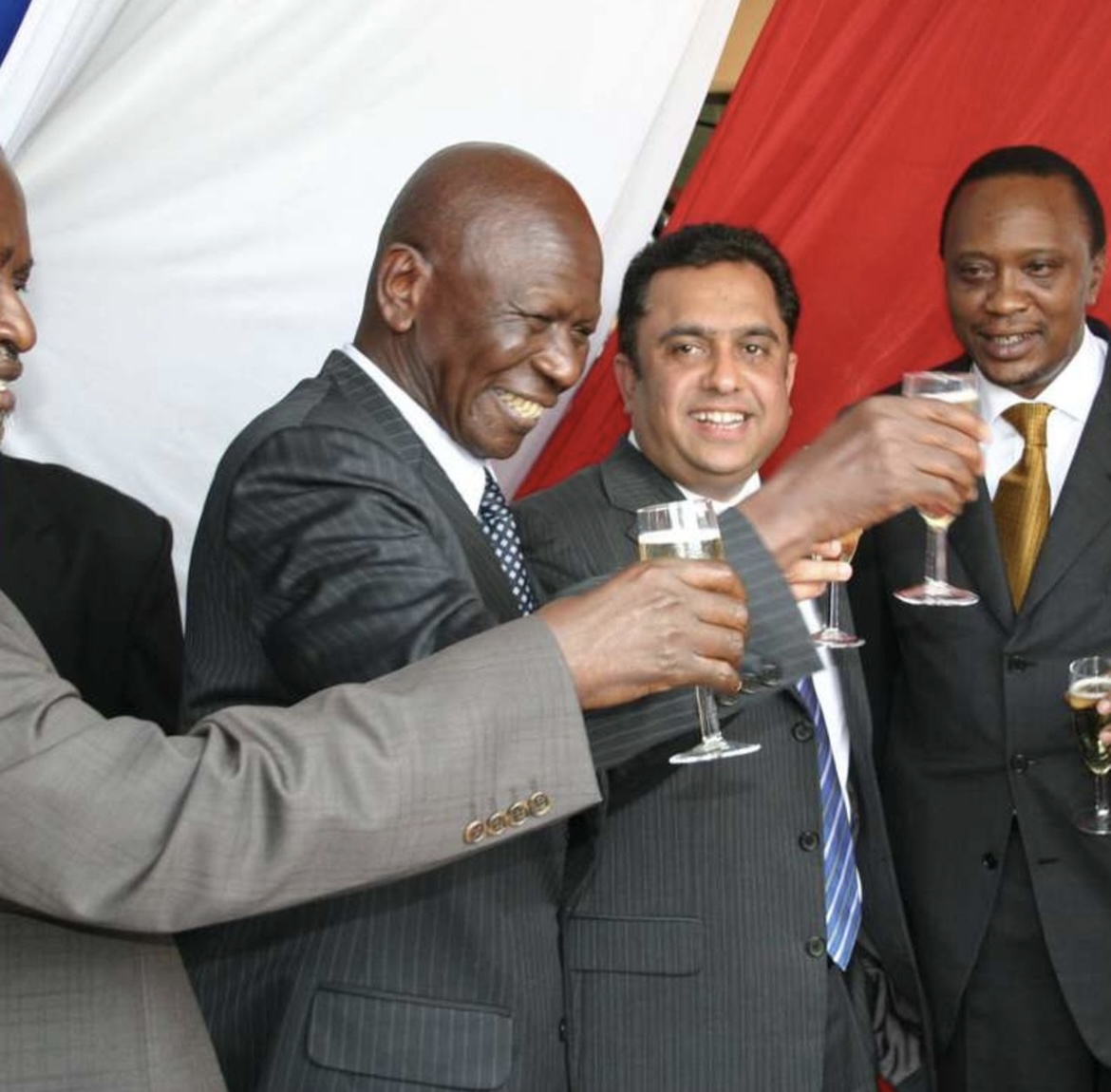
Criminal mastermind Yagnesh Devani with former President Uhuru Kenyatta and former Vice President Moody Awori
-
- Date: February 2024 (withdrawal followed Devani’s plea after extradition).
- Case Details: Ingonga withdrew charges against tycoon Yagnesh Devani in a Ksh 7.6 billion petroleum products case, citing a lack of witnesses and documentary evidence. Initiated in 2008, the case alleged that Devani’s Triton Petroleum Company Limited swindled the government. Devani fled to the UK, was extradited in 2024, and took a plea in February before the case was dropped under Section 87(a) of the Criminal Procedure Code.
- Severity: The Ksh 7.6 billion loss is among Kenya’s largest corruption scandals, impacting the energy sector and public finances. The withdrawal of such a high-profile case signals impunity for mega-corruption.
- Duplicity: The claim of insufficient evidence is dubious, given the case’s 16-year history and prior EACC investigations. The prosecution’s assertion that witnesses were reluctant or deceased lacks public substantiation, raising suspicions of external pressure. This aligns with a pattern of protecting politically connected individuals.
June 2024: Kinanie Leather Industrial Park Water Supply Project (Sh292.7 Million Procurement Fraud)
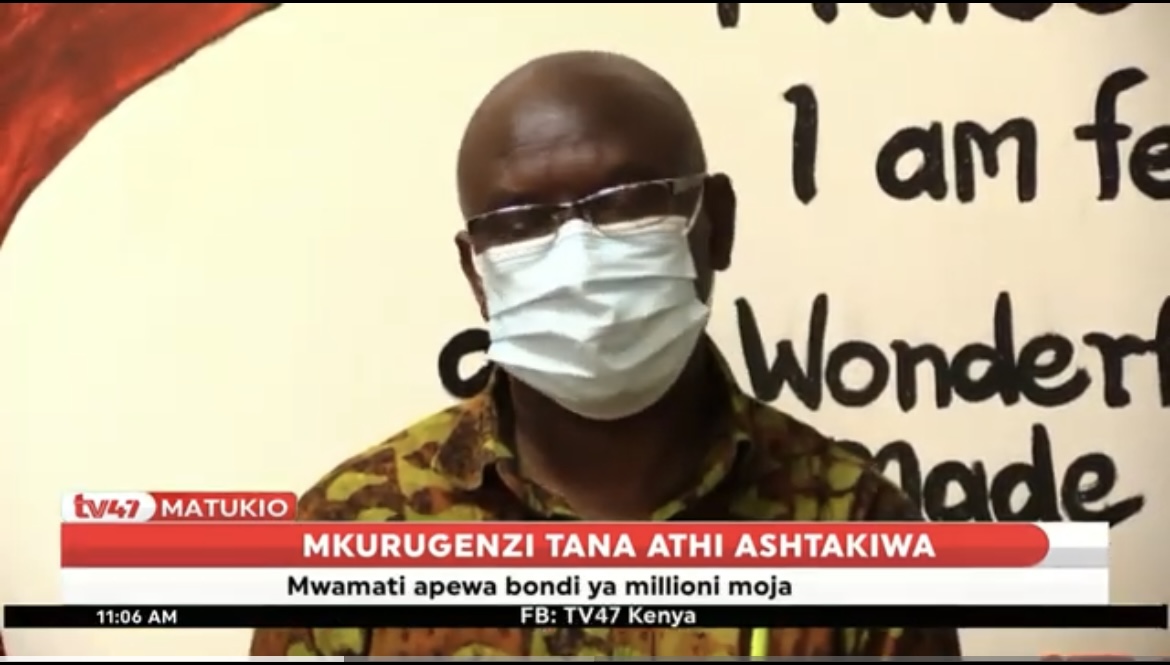
Frederick Mwamati who engineered a monumental heist at the Tana & Athi Water Words Development Agency
-
- Date: June 2024.
- Case Details: Ingonga withdrew charges against 12 individuals, including Fredrick Mwamati, CEO of Tanathi Water Works Development Agency, accused of procurement fraud in a Sh292.7 million tender for the Kinanie Leather Industrial Park Water Supply Project. The EACC recommended nine charges, including conspiracy to commit corruption and unlawful acquisition of public property. Ingonga initially directed arrests but later withdrew the case, allegedly at the suspects’ request. The EACC protested, arguing in a nine-page affidavit that the withdrawal was in bad faith. Kitui Chief Magistrate David Mburu allowed the withdrawal, citing public interest.
- Severity: The fraudulent tender process, involving alleged kickbacks, deprived Kitui County of critical water infrastructure, exacerbating service delivery challenges.
- Duplicity: The EACC’s claim that the withdrawal was at the suspects’ request suggests a lack of independence. Ingonga’s initial approval of prosecution, followed by a reversal, violates Article 157(11) and Article 10, which emphasize integrity and transparency in public office.
July 2024: Moses Lenolkulal (Former Samburu Governor)
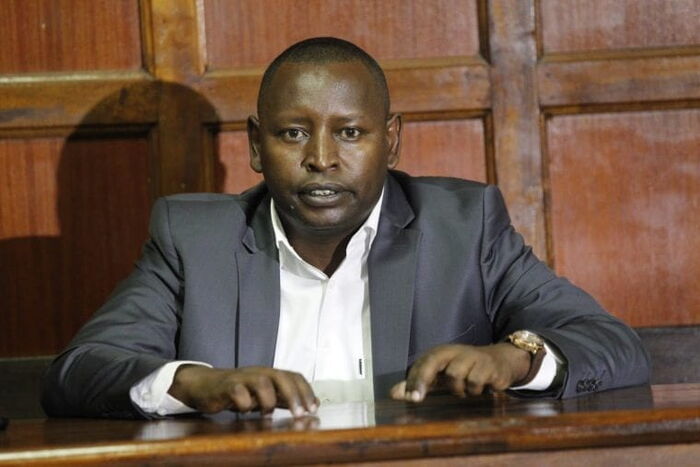
Thug: Former Samburu Governor Moses Lenolkulal is enjoying the fruits of freedom as the DPP hunts down bloggers
-
- Date: July 2024 (approximate, based on sequence of events).
- Case Details: Ingonga attempted to withdraw graft charges against former Samburu Governor Moses Lenolkulal, accused of misappropriating public funds. Public and judicial scrutiny forced the DPP to reverse the decision, allowing the case to proceed.
- Severity: The case involved significant public funds, impacting development in Samburu County, a marginalized region. Corruption of this scale perpetuates poverty and inequality.
- Duplicity: The initial attempt to withdraw the case, followed by a reversal, exposes the DPP’s inconsistent approach, suggesting susceptibility to external influence in violation of Article 157(10), which guarantees DPP independence.
August 2024: Josephat Kipkoech Sirma and Others (Kenya Pipeline Corporation Corruption Case)
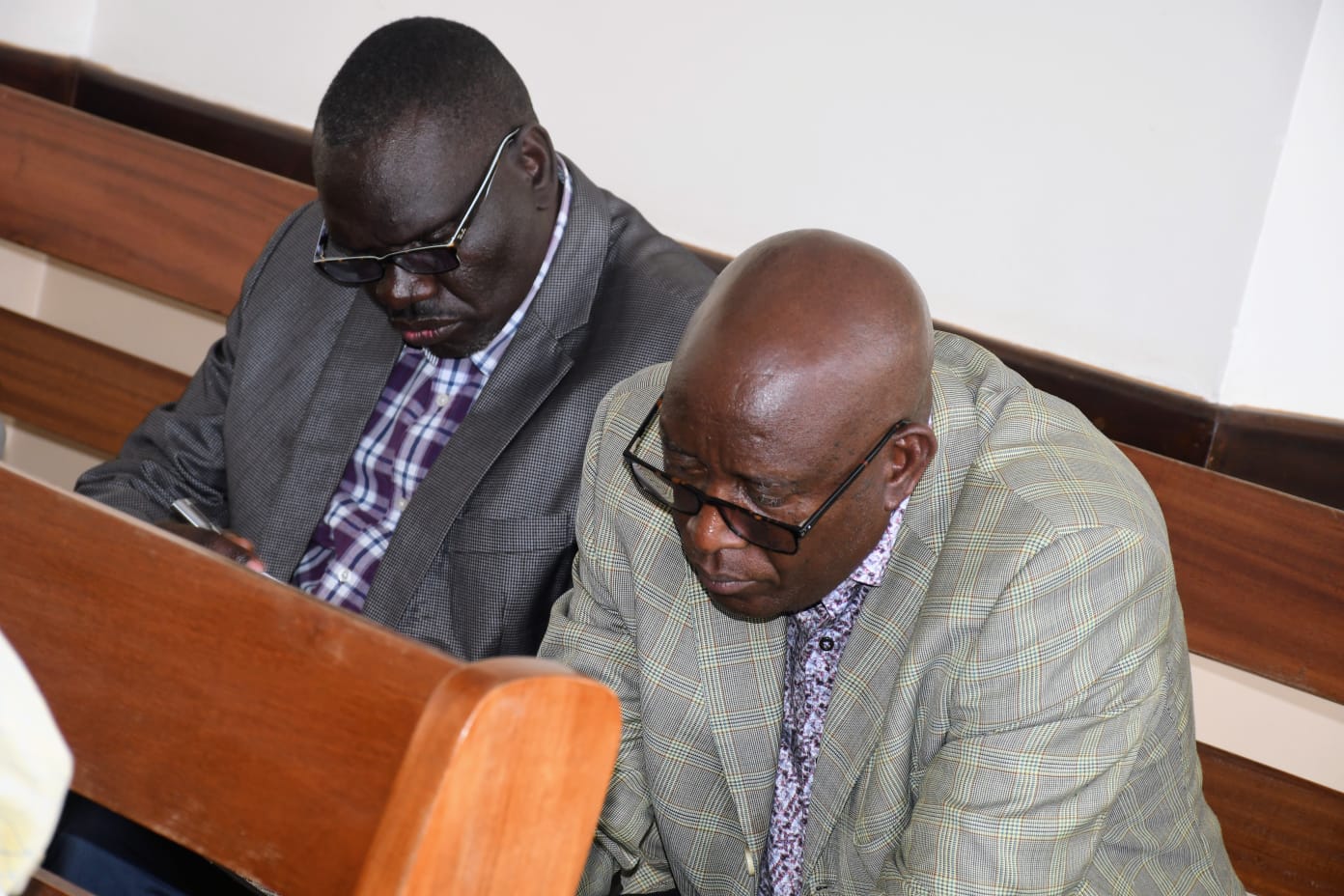
Josephat Kipkoech Sirma‘s Kenya Pipeline’s chief engineer.
-
- Date: August 2024 (approximate, based on judicial timelines).
- Case Details: Ingonga sought to withdraw charges against Kenya Pipeline Corporation Chief Engineer Josephat Kipkoech Sirma, while proceeding against co-accused. Senior Principal Magistrate Victor Wakumile rejected the application, prompting Sirma’s appeal to the High Court. Justice Nixon Sifuna condemned the DPP’s selective withdrawals as a “vice” gaining notoriety in Kenya’s justice system.
- Severity: The case involved corruption in a critical state corporation, affecting the energy sector and public service delivery.
- Duplicity: The selective withdrawal suggests favoritism, violating Article 27’s principle of equality before the law. Justice Sifuna’s ruling underscores the DPP’s abuse of discretion, undermining judicial integrity.
Impact on the Rule of Law
Ingonga’s withdrawal of cases involving over Sh10 billion in public funds erodes Kenya’s rule of law. The Kenyan Constitution mandates:
- Article 10: National values of integrity, transparency, and accountability.
- Article 157(10): DPP independence from external control.
- Article 157(11): Acting in the public interest and preventing legal process abuse.
These withdrawals:
- Shield the Powerful: Cases involving Lenolkulal, Devani, and Kiborek suggest executive influence, violating Article 157(10).
- Erode Public Trust: Lack of transparency, as in the Njenga and Devani cases, fosters perceptions of impunity.
- Undermine Anti-Corruption Efforts: EACC protests, particularly in the Kinanie case, highlight institutional conflicts, breaching Kenya’s obligations under the United Nations Convention Against Corruption (UNCAC).
- Prompt Judicial Rebukes: Rulings by Nzyoki and Sifuna label the DPP’s actions a “vice,” threatening judicial integrity.
EACC-ODPP Tensions Over Case Withdrawals
The Ethics and Anti-Corruption Commission (EACC) has repeatedly clashed with the Office of the Director of Public Prosecutions (ODPP) over the withdrawal of high-profile corruption cases, undermining Kenya’s anti-corruption efforts.
The EACC, tasked with investigating graft, has accused the ODPP, led by DPP Renson Ingonga, of dropping cases without sufficient justification, often at the request of suspects or due to claims of insufficient evidence, despite the EACC providing what it considers robust investigative files.
Notable instances include the withdrawal of a multimillion-shilling graft case involving the Tanathi Water Works Development Agency and disputes over cases like that of former Kakamega Governor Wycliffe Oparanya, where the EACC insisted charges should proceed while the ODPP claimed they were dropped.
These conflicts have fueled public distrust, with the EACC arguing that such withdrawals disregard public interest and enable suspects to evade justice, while the ODPP maintains its constitutional mandate to independently review evidence and make prosecutorial decisions.
This discord has prompted calls from groups like Transparency International to grant the EACC prosecutorial powers to reduce conflicting decisions, though such a move raises complex constitutional questions.
Criticism and Petitions Against DPP Ingonga’s Case Withdrawals
Transparency International Kenya has been a vocal critic of Director of Public Prosecutions (DPP) Renson Ingonga’s frequent withdrawal of high-profile corruption cases, arguing that these actions erode public trust in Kenya’s justice system and allow impunity to flourish.
The organization has highlighted cases like the Sh7.6 billion Triton Petroleum fraud and the Sh290 million Kitui Water project, where Ingonga’s office cited insufficient evidence despite opposition from the Ethics and Anti-Corruption Commission (EACC), as evidence of systemic weaknesses or potential compromise.
Public sentiment, reflected in social media campaigns like #ResignIgonga, has intensified, with individuals like businessman Hussein Aila Amaro filing a petition with the Public Service Commission (PSC) in February 2025, accusing Ingonga of misconduct for withdrawing a case involving death threats.
Although the High Court halted the PSC’s consideration of this petition, critics, including prominent lawyer Donald Kipkorir, argue that Ingonga’s pattern of dropping cases linked to politically connected individuals undermines his constitutional duty to protect public interest, fueling demands for his removal.
Persecution of Francis Gaitho and Others: A Stark Contrast
While Ingonga withdraws mega-corruption cases, he aggressively targets dissenters under the Cybercrimes Act:
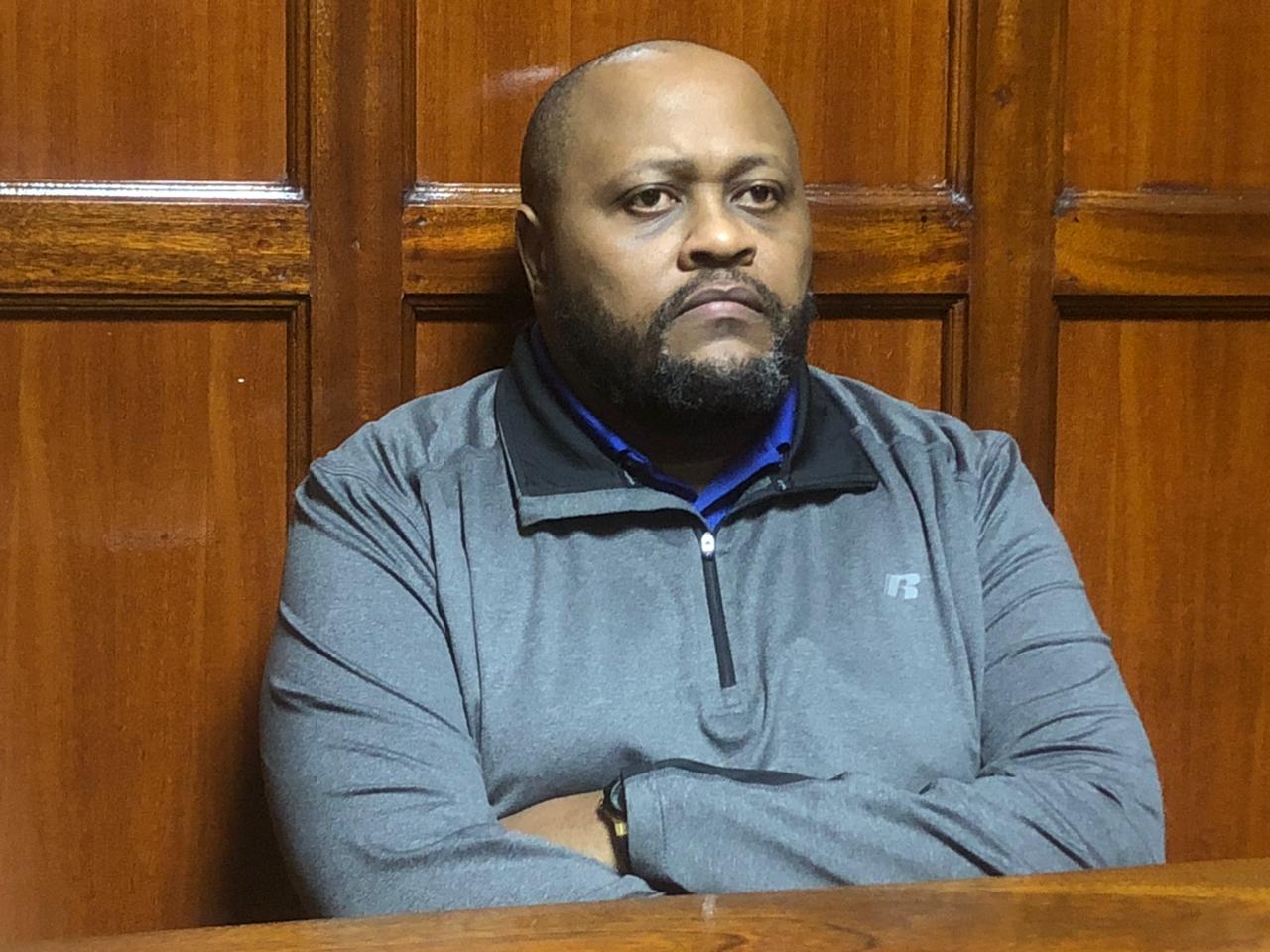
As he withdraw high-profile cases, the DPP continues to expend inordinate resources in pursuit Francis Gaitho just for tweeting
- Francis Gaitho (2024):
-
- Case Details: In 2024, armed police, directed by DCI boss Mohammed Amin and Head of Special Crimes Michael Sang, raided Gaitho’s homes, confiscating five cellphones, a laptop, and two cameras. He was jailed twice at Kamukunji Police Station under harsh conditions, charged for tweets critical of the government under the Computer Misuse and Cybercrimes Act. The seizure of his tools crippled his journalism work.
-
- Severity: Gaitho’s “crime” was exercising free speech, protected under Article 33 and Article 19 of the International Covenant on Civil and Political Rights (ICCPR). The disproportionate response contrasts with the leniency shown to corrupt elites.
-
- Duplicity: Ingonga’s pursuit of Gaitho for non-criminal speech, while citing “insufficient evidence” in multi-billion-shilling graft cases, reveals selective justice, violating Article 27 (equal protection) and Article 50 (fair trial).
- Duplicity: Ingonga’s pursuit of Gaitho for non-criminal speech, while citing “insufficient evidence” in multi-billion-shilling graft cases, reveals selective justice, violating Article 27 (equal protection) and Article 50 (fair trial).
-
- The arrest and charging of Alinur Mohammed Bule and Scophine Aoko Otieno, known as Maverick Aoko, in 2024 for publishing allegedly false or defamatory social media posts have fueled accusations of professional impropriety against Director of Public Prosecutions (DPP) Renson Ingonga. Alinur faced charges on July 18, 2024, for falsely claiming on X to be a State House spokesperson, released on Ksh30,000 bail, while Aoko was arrested on August 16, 2024, for posts targeting Beth Mbuitu, daughter of a powerful police officer, and charged under the Computer Misuse and Cybercrimes Act, securing Ksh100,000 bail after a controversial detention involving alleged harassment and a reported miscarriage.
-
- Critics argue that the DPP’s swift prosecution of social media users for relatively minor offenses starkly contrasts with his office’s withdrawal of high-profile corruption cases, such as the Sh7.6 billion Triton Petroleum fraud, allowing politically connected individuals to evade accountability for serious crimes, raising questions about selective justice and misuse of prosecutorial power.
- Critics argue that the DPP’s swift prosecution of social media users for relatively minor offenses starkly contrasts with his office’s withdrawal of high-profile corruption cases, such as the Sh7.6 billion Triton Petroleum fraud, allowing politically connected individuals to evade accountability for serious crimes, raising questions about selective justice and misuse of prosecutorial power.
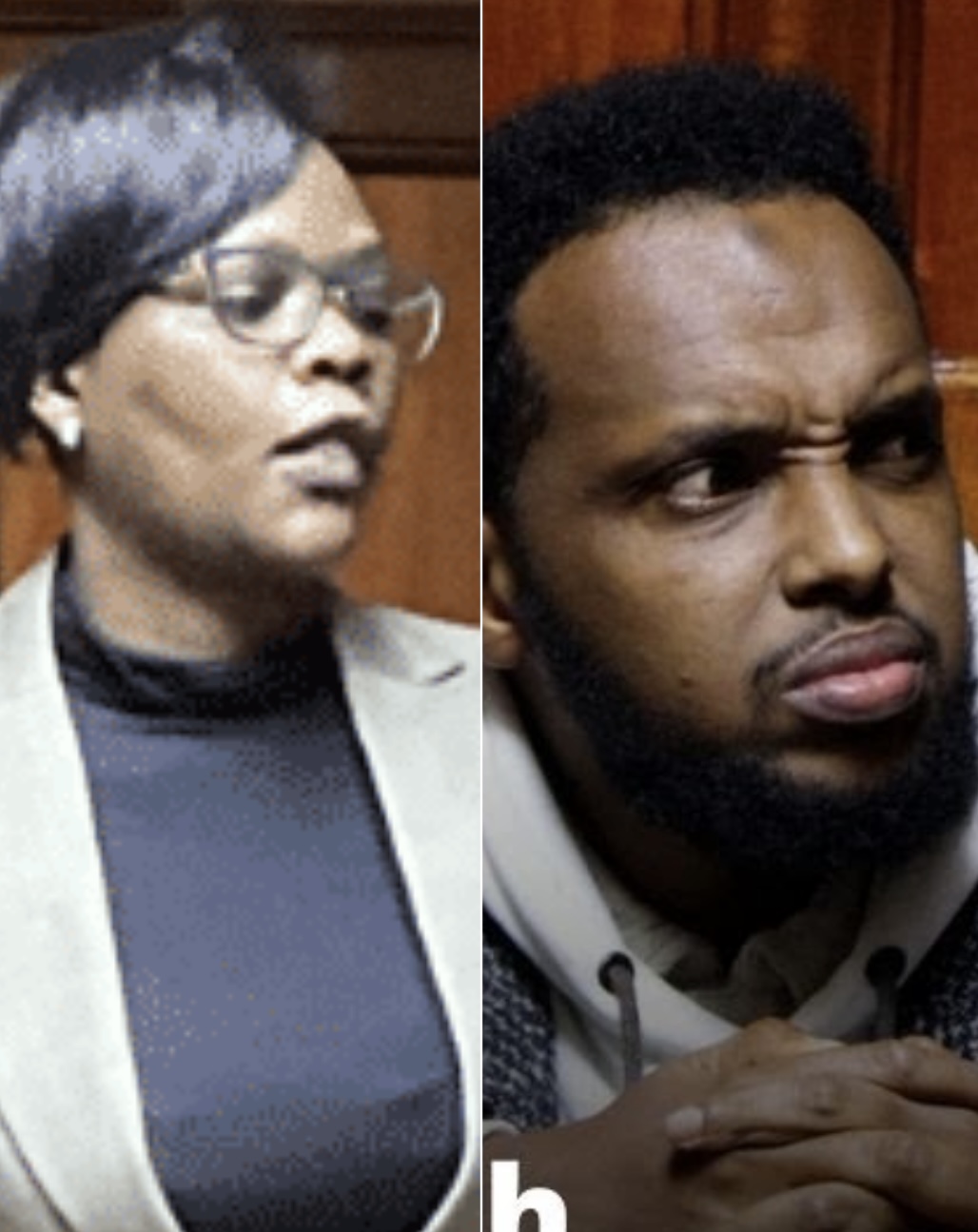
For the crime of tweeting, Scofine “Maverick” Aoko and Alinur Mohammed were detailed in jail and hauled in court by the DPP
Call for Magnitsky Sanctions
Ingonga’s actions violate the Kenyan Constitution and international law, justifying Magnitsky sanctions under frameworks like the U.S. Global Magnitsky Act:
- Constitutional Violations:
-
- Article 10: Withdrawals undermine integrity and transparency.
- Article 27: Selective prosecution of dissenters violates equal protection.
- Article 33: Persecuting Gaitho and others contravenes free expression.
- Article 157(10-11): External influence and failure to act in the public interest breach the DPP’s mandate.
- International Law Violations:
-
- ICCPR Article 19: Suppressing speech violates freedom of expression.
- UNCAC Articles 5, 30: Withdrawing corruption cases undermines anti-corruption measures.
- African Charter Article 9: Targeting dissenters violates the right to disseminate information.
- Sanctions Justification: Ingonga’s pattern of shielding corrupt elites while persecuting critics constitutes gross human rights abuses and enables corruption, harming Kenya’s democracy and public welfare.
Urgent Call to Action for Embassies and Rights Groups
The international community and local advocacy groups must act decisively to address Ingonga’s judicial atrocities. Embassies in Kenya, including those of the United States, United Kingdom, and European Union, should prioritize imposing targeted sanctions on Ingonga for his role in undermining the rule of law and suppressing dissent. Local rights groups, such as the Kenya Human Rights Commission and the Law Society of Kenya, must amplify their advocacy, filing petitions and mobilizing public pressure to hold the DPP accountable.
International organizations like Human Rights Watch and Amnesty International should investigate and document these abuses, advocating for Magnitsky-style sanctions to deter further violations. Collective action is essential to protect Kenya’s democratic institutions and ensure justice for victims of corruption and persecution.
Conclusion
Renson Ingonga’s withdrawal of high-profile corruption cases, contrasted with the persecution of Francis Gaitho and other dissenters, reveals a deliberate strategy to protect Kenya’s corrupt elite while silencing accountability.
This duplicity violates the Kenyan Constitution and international law, eroding the rule of law and public trust.
Targeted Magnitsky sanctions against Ingonga, supported by embassies and rights groups, are essential to hold him accountable and restore justice in Kenya’s fight against corruption and defense of democratic freedoms.
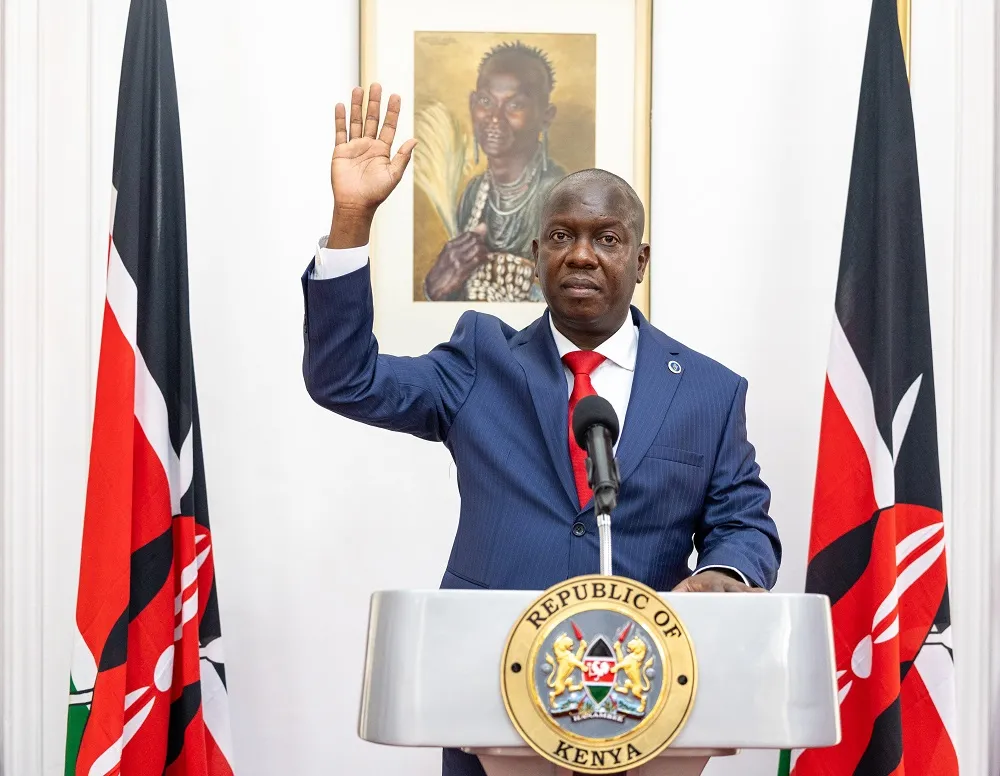

1 comment
This is true, need sanctions, go Francis 👍😅⚡🤣🤘👏